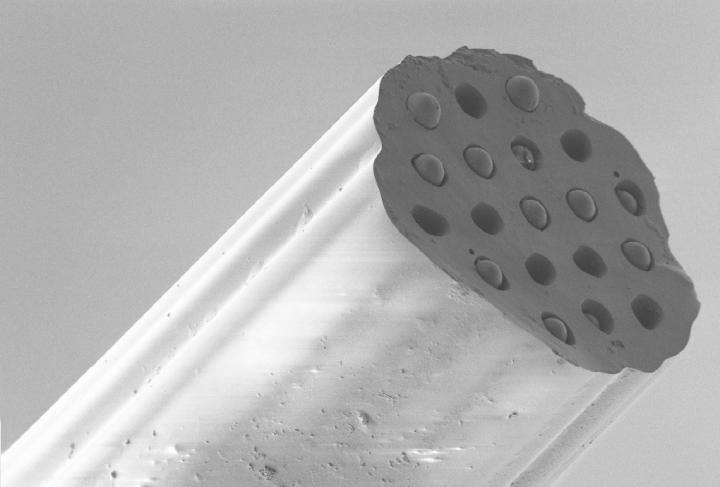
Credit: Michael Tanner, Herriot-Watt University and the University of Edinburgh.
A hair-sized probe that can measure key indicators of tissue damage deep in the lung has been developed by scientists.
The new technology could pave the way for accurate monitoring of tissue in areas where existing technologies cannot reach.
Experts say the probe can pick up tiny changes in tissue health and could improve how patients are assessed and treated, specifically those on ventilators in intensive care.
Lung diseases are one of the leading causes of death and disability in the world. Despite significant advances, little is known about how disease develops in patients suffering from pneumonia or lung injury.
A team of scientists developed the probe, which comprises an optical fibre about 0.2mm in diameter that holds 19 sensors.
Each sensor can measure different indicators in tissues, such as acidity and oxygen levels, which provide important information on the body’s reaction to disease processes.
Researchers have designed the technology to offer fast, accurate measurements and the flexibility to add more sensors.
Experts say the technology is widely applicable to other regions of the body and could be used to aid the understanding of inflammatory and bacterial diseases.
The research was supported by the UK’s Engineering and Physical Sciences Research Council (EPSRC) through support of the Proteus consortium, which includes the Universities of Edinburgh and Bath and Heriot-Watt University. It is published in Scientific Reports.
Dr Michael Tanner, Proteus Research Fellow at Heriot-Watt University and the University of Edinburgh, said: “This research is a great example of collaboration across disciplines to tackle healthcare challenges. These new methods, if taken to clinic, will lead to novel insights in disease biology. Our aim now is to expand the number of unique sensors on this miniaturised platform to provide even more information.”
###
Media Contact
Guy Atkinson
[email protected]
Related Journal Article
http://dx.




